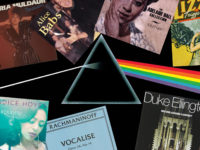Ever since he asked that existential question “Is She Really Going Out with Him?,” Joe Jackson has defied categorization, moving from the initial new-wave label into other genres such as jazz and Latin music. On The Duke (due June 26, 2012 from Ear Music), he returns to the jazz realm by paying tribute to the legendary Duke Ellington. While this goal is noble, combining Ellington’s elegant melodies with rock often results in misses rather than hits.
For this project, Jackson decided to radically reinterpret many of Ellington’s best-known works. “I didn’t want to make a reverent album,” he explains on his website. Curiously, he decided to eliminate all horns. “I wanted to take it in a completely different direction, and there was a danger of just sounding like watered-down Ellington if it wasn’t different enough. Not using horns was a good place to start.” Typically, Joe Jackson likes to turn listener expectations on their heads, which is admirable.
Yet this move drains classics like “Isfahan” of vibrancy. Instead, his ethereal rearrangement makes the track sound like smooth jazz or “chill” music. Would Ellington really appreciate his gorgeous melody flattened by electric guitar or ghostly piano?
Some remakes emit sparks, but all too few. The “I’m Beginning to See the Light / Take the A Train” medley highlights their complimentary melodies, and Joe Jackson’s distinctively sharp voice lends the former song a wittier quality. Violinist Regina Carter and bassist Christian McBride lend their usual superior artistry to the track, giving it the uptempo bop rhythm it desperately needs. The Duke would have benefited from such treatments that better reflect the original versions. Jackson does lend his pipes to “Mood Indigo,” but the electric guitar and violin, along with Jackson’s slow, drawling vocal, sucks the song of life, instead rendering it a droning western feel.
Surprising guest appearances abound on The Duke, including Sharon Jones (sans Dap-Kings) effectively stressing the bluesy part of the song “I Ain’t Got Nothing But the Blues.” The rock-heavy backing — anchored by Christian McBride’s deft bass — sounds as if Stevie Ray Vaughan had decided the cover the track. Jones should seriously consider recording an album of Ellington’s blues numbers, as she appears very comfortable strutting through the sassy words. Contrast that with Joe Jackson’s strange duet with Iggy Pop on “It Don’t Mean a Thing (If It Ain’t Got That Swing).” While the band swings fairly convincingly, Pop sounds overwhelmed and totally out of his comfort zone. The electronic elements also prove unnecessary for such a catchy standard.
One of The Duke’s best cuts, “Perdido/Satin Doll,” wisely plays up its bossa nova roots by featuring Lilian Vieira, of the Brazilian/Dutch collective Zuco 103, on lead vocals. While it would have benefited most from stressing the song’s Brazilian aspects in lieu of incorporating rock, it still showcases how “Perdido” and the ubiquitous “Satin Doll” contain irresistible, memorable melodies that are typical of Ellington’s genius.
Joe Jackson’s obvious love of jazz is commendable, and like peer Elvis Costello, he continually expands his sound and experiments in other genres. However, tinkering with Ellington’s elegant and groundbreaking catalog is a dangerous undertaking, and much of The Duke falls short of capturing the timeless essence of these songs. Sometimes radically rebuilding familiar tracks robs them of their original qualities. In other words, the cliché often rings true: you simply cannot improve on perfection.
- How John Lennon Came Roaring Back on the Beatles’ White Album - November 22, 2023
- Five ‘With the Beatles’ Deep Cuts That Illustrate Their Lasting Debt to R&B - November 20, 2023
- Five Must-Hear Deep Cuts from the Beatles’ ‘Past Masters’ - March 7, 2023



